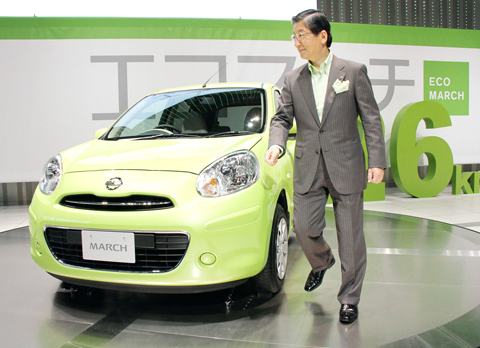Nissan Motor Co said yesterday it might suspend production in the US and Mexico due to a delay in the delivery of engine control units, after announcing it would interrupt output in Japan.
“We are verifying inventories and are considering appropriate responses,” Nissan chief operating officer Toshiyuki Shiga told reporters.
Nissan has three US plants that have a total output capacity of 950,000 vehicles every year. In Mexico it has four manufacturing and distribution facilities with an annual production capacity of more than 300,000 units. Japan’s third-largest car maker said on Monday it would temporarily halt production lines at home for three days starting today after supplier Hitachi Automotive Systems could not deliver the parts on time.

PHOTO: BLOOMBERG
Hitachi said it could not receive a type of custom integrated circuit, a main component of the engine control unit, in time from a supplier, without identifying that company. The suspension affects about 15,000 units in Japan.
“It is a random and unexpected case. We do not have another immediate solution, but in the future I hope that we will be prepared to respond to this kind of urgent situation,” Shiga said.
The delay is also affecting Honda and Fuji Heavy Industries — the company behind the Subaru brand — although 90 percent of the parts are used to supply Nissan.
Nissan yesterday also took the wraps off its new March subcompact, which is being manufactured in Thailand for sale in Japan.
Nissan said it was setting up a special inspection facility at its Oppama plant in Japan, which used to make the model, to do additional quality checks on the Thai-made March to ensure it makes the cut with notoriously finicky Japanese customers.
“We are not hiding that this was made in Thailand,” Shiga said in answer to a reporter’s question on why his presentation had focused on the car’s green features, not where it was made.
“It is important to deliver value to customers wherever we make our products,” he said.
The March, previously been made in the UK, will now also be made in India, where it will be exported to more than 100 countries in Europe, the Middle East and Africa. The model — called the Micra in Europe, India and Australia — will be produced in Mexico and China as well.
The March starts in Japan at ¥999,600 (US$11,000).

LONG FLIGHT: The jets would be flown by US pilots, with Taiwanese copilots in the two-seat F-16D variant to help familiarize them with the aircraft, the source said The US is expected to fly 10 Lockheed Martin F-16C/D Block 70/72 jets to Taiwan over the coming months to fulfill a long-awaited order of 66 aircraft, a defense official said yesterday. Word that the first batch of the jets would be delivered soon was welcome news to Taiwan, which has become concerned about delays in the delivery of US arms amid rising military tensions with China. Speaking on condition of anonymity, the official said the initial tranche of the nation’s F-16s are rolling off assembly lines in the US and would be flown under their own power to Taiwan by way

CHIP WAR: The new restrictions are expected to cut off China’s access to Taiwan’s technologies, materials and equipment essential to building AI semiconductors Taiwan has blacklisted Huawei Technologies Co (華為) and Semiconductor Manufacturing International Corp (SMIC, 中芯), dealing another major blow to the two companies spearheading China’s efforts to develop cutting-edge artificial intelligence (AI) chip technologies. The Ministry of Economic Affairs’ International Trade Administration has included Huawei, SMIC and several of their subsidiaries in an update of its so-called strategic high-tech commodities entity list, the latest version on its Web site showed on Saturday. It did not publicly announce the change. Other entities on the list include organizations such as the Taliban and al-Qaeda, as well as companies in China, Iran and elsewhere. Local companies need

CRITICISM: It is generally accepted that the Straits Forum is a CCP ‘united front’ platform, and anyone attending should maintain Taiwan’s dignity, the council said The Mainland Affairs Council (MAC) yesterday said it deeply regrets that former president Ma Ying-jeou (馬英九) echoed the Chinese Communist Party’s (CCP) “one China” principle and “united front” tactics by telling the Straits Forum that Taiwanese yearn for both sides of the Taiwan Strait to move toward “peace” and “integration.” The 17th annual Straits Forum yesterday opened in Xiamen, China, and while the Chinese Nationalist Party’s (KMT) local government heads were absent for the first time in 17 years, Ma attended the forum as “former KMT chairperson” and met with Chinese People’s Political Consultative Conference Chairman Wang Huning (王滬寧). Wang

OBJECTS AT SEA: Satellites with synthetic-aperture radar could aid in the detection of small Chinese boats attempting to illegally enter Taiwan, the space agency head said Taiwan aims to send the nation’s first low Earth orbit (LEO) satellite into space in 2027, while the first Formosat-8 and Formosat-9 spacecraft are to be launched in October and 2028 respectively, the National Science and Technology Council said yesterday. The council laid out its space development plan in a report reviewed by members of the legislature’s Education and Culture Committee. Six LEO satellites would be produced in the initial phase, with the first one, the B5G-1A, scheduled to be launched in 2027, the council said in the report. Regarding the second satellite, the B5G-1B, the government plans to work with private contractors